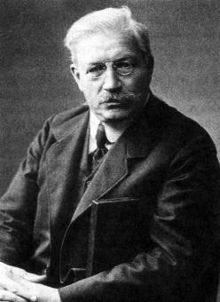Paul Miliukov
| Pavel Milyukov | |
|---|---|

Milyukov in 1916
|
|
| Foreign Minister of the Russian Provisional Government | |
|
In office 2 March 1917 – 2 May 1917 |
|
| Prime Minister | Georgy Lvov |
| Preceded by | Nikolai Pokrovsky (for Russian Empire) |
| Succeeded by | Mikhail Tereshchenko |
| Personal details | |
| Born |
Pavel Nikolayevich Miliukov 27 January 1859 Moscow, Russian Empire |
| Died | 31 March 1943 (aged 84) Aix-les-Bains, France |
| Political party | Constitutional Democratic |
| Alma mater | Moscow State University |
Pavel Nikolayevich Miliukov (or Milyukov) (Russian: Па́вел Никола́евич Милюко́в; 27 January [O.S. 15 January] 1859 – 31 March 1943) was a Russian historian and liberal politician. His name is sometimes rendered in English as Paul Miliukov or Paul Milukoff. Milyukov was the founder, leader, and the most prominent member of the Constitutional Democratic party (known as the Kadets). In the Russian Provisional Government, he served as Foreign Minister, working to prevent Russia's exit from the First World War.
Pavel was born in Moscow in the middle-class family of a professor in architecture who taught at the school of arts. Milyukov studied history and philology at the Moscow University, where he was influenced by Herbert Spencer, Auguste Comte, and Karl Marx. His teachers were Vasily Klyuchevsky and Paul Vinogradoff. In summer 1877 he briefly took part in Russo-Turkish War as a military logistic, but returned to the university. He was expelled for taking part in student riots, went to Italy, but was readmitted and allowed to take his degree. He specialized in the study of Russian history and in 1885 received the degree for a work on the State Economics of Russia in the First Quarter of the 18th Century and the reforms of Peter the Great.
In 1890 he became a member of the Moscow Society of Russian History and Antiquities. He gave private lectures with great success at a training institute for girl teachers and in 1895 he was appointed at the university. These lectures were afterwards expanded by him in his book Outlines of Russian Culture (3 vols., 1896–1903, translated into several languages). He started an association for “home university reading,” and, as its first president, edited the first volume of its program, which was widely read in Russian intellectual circles. As a student Milyukov was influenced by the liberal ideas of Konstantin Kavelin and Boris Chicherin. His liberal opinions brought him into conflict with the educational authorities, and he was dismissed in 1894 after one of the ever-recurrent university “riots.” He was imprisoned for two years in Riazan as a political agitator, but contributed as an archaeologist.
...
Wikipedia
